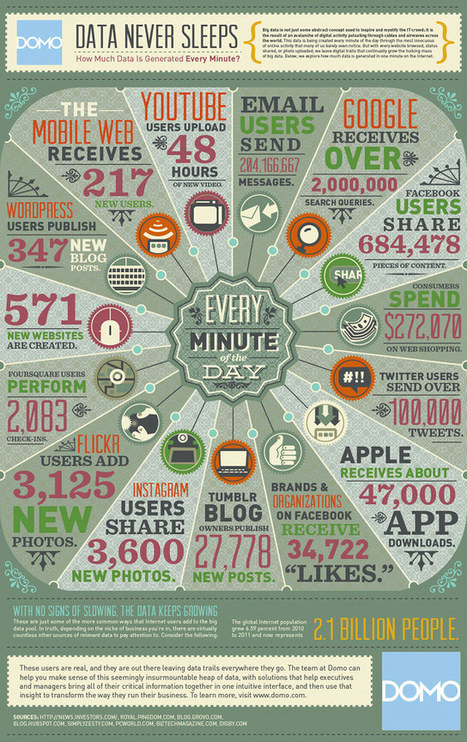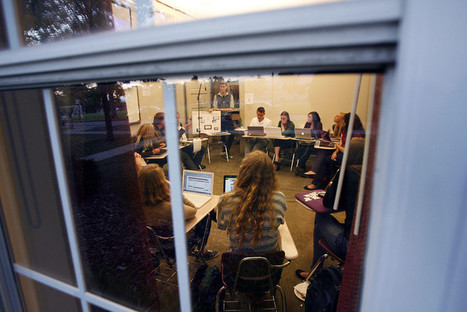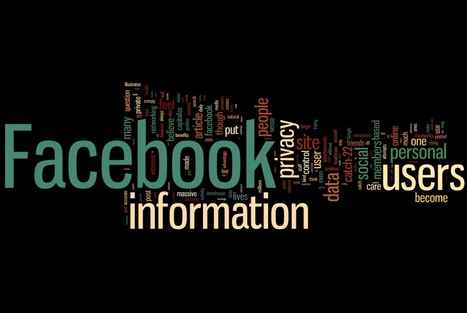With his no-tracking search engine, Gabriel Weinberg is taking on the big boys.
Research and publish the best content.
Get Started for FREE
Sign up with Facebook Sign up with X
I don't have a Facebook or a X account
Already have an account: Login
Class Resources for Penn State Berks CAS 383 Course.
Curated by
John Shank
 Your new post is loading... Your new post is loading...
 Your new post is loading... Your new post is loading...

Brittanie Rushing's comment,
November 6, 2012 8:48 AM
It is easy for these online relationships to become like the idea Turkle introduced of "self-object." We do not actually see these people so we do not know in completeness who they are. We lean on them and maybe even fill some of our emotional voids with them. Sadly they are human so even if we do not know everything about them and think that makes the relationship easier we are bound to be disapointed.

's comment November 6, 2012 10:07 AM
The idea of the "self-object" is all about the fragility of our own psyches. The fragile individual makes the self-object a part of himself or herself, creating a somewhat imaginary persona for "the other" that satisfies the fragile individual. Sound a bit psychoanalytic? Thank Heinz Kohut for that. In online relationships, we might only know someone through a half-light, or only by what they choose to divulge about themselves... but this lets the fragile individual imagine the other person in a way that may temporarily strengthen his or her fragility.

Sung Hyun Kim's comment,
November 7, 2012 8:32 PM
Online relationships could turn dangerous since we are able to create another fake image in the virtual world. Turkle explains that self object is a sense of self that people project towards the others however not having to show every single aspect of yourself. Social Networking System has created a space where creating a fake identity and interacting with other individuals possible. However, despite the convenience of being able to communicate instantly, it could also create dangers to some as well. We may be able to carry on the conversation well over on the screen but we're never sure who you're really talking to.
Patricia Sanford's comment,
October 23, 2012 12:12 AM
The four issues that dominate the issue of youth safety whether via the internet or via daily interaction are: sexual solicitation, harassment, exposure to inappropriate content, and youth-generated problematic content. All of these issues are prevalent in society but sometimes obscured from view...while it is easy to blame the internet for them, the source actually lies with society and the behavior that exists and goes unnoticed. Blaming the internet is a way of pointing a finger at the problem but it is not accurately directed to the source.

Diamond Turton's comment,
October 23, 2012 1:34 AM
According to "The Conundrum of Visibility: Youth Safety and the Internet" the four issues that dominate the conversation are sexual solicitation, harassment, exposure to inappropriate content and youth generated problematic content.

Brittanie Rushing's comment,
October 1, 2012 10:15 PM
Basically in academics wikipedia is not acceptable because it is not necessarily true. Anybody can get on wiki and change things to what they want it to say true or not. It is an unreliable source if it cannot be verified and any old person can put up whatever they want.
Monica Jones's comment,
October 2, 2012 1:02 AM
As reviewed in “Wikipedia in the Newsroom,” it's stating that Wikipedia is not an accurate site to get your information from. Anybody can go into Wikipedia and add information whether it be false or true. Basically they are saying that it's unreliable.

Chris Bechtel's comment,
October 2, 2012 11:46 AM
Academics view Wikipedia as a questionable source. It's okay to view content on Wikipedia in order to garner cited sources but the info itself in unverifiable. From Wikipedia, people can count on the same level of credibility as other social sites like Facebook and Twitter. Although social media sites are generally more "gossip centric", the generators of the content are no more scholarly than those that create content for Wikipedia.
|

's comment November 26, 2012 7:20 PM
Smart machines have undoubtedly proven to be useful tools. Voice recognition software in our phones, computers and cars can simplify information searches and literally take us from place to place when combined with GPS. But in business and government, where human emotion can be necessary in making important decisions, smart machines would fail. Additionally, smart machines essentially make affluence obsolete-- how well a person speaks means nothing to a machine that is programmed to algorithmically comprehend commands. While jobs would be created in developing the artificial intelligence, many more call center jobs would be lost. Forget about outsourcing... a machine has no need for a paycheck.

Brittanie Rushing's comment,
November 26, 2012 8:50 PM
Artificial Intelligence is basically going to take over everything. We will not need people to do anything in any division of government, jobs, or society. People now days hardly converse with each other without some sort of technology and most parts of a job and government. I can't say that i disagree it is a form of isolation.

Sung Hyun Kim's comment,
November 26, 2012 11:04 PM
After reading this article, I began to think about all the automated machines that help us within the daily needs of our lives. The car navigation that we tend to use everyday has an automated voice that leads us to different places by calculating the closest distance within seconds. These machines are now being equipped with more sophisticated intelligence so that many of them are being able to talk and even respond to our needs either by mere computing or with calculation. Our generation and even the younger ones are starting to see how these technologies are slowly taking over the hassels that we had to face in to much easier process. They may be taking over many of the occupations but we are also sure that these technologies itself is helping the economy as well.

Alex Patton's comment,
November 13, 2012 12:51 AM
Google wants to connect everyone with just using google. By adding google chrome this makes them able to have all different types of interaction using the web for almost anything. Google's central idea is that they can make everyone use only google and with google chrome this is becoming more reasonable, not its not likely yet.

Sung Hyun Kim's comment,
November 13, 2012 1:50 AM
Chrome became a game changer for internet browsers but also in the advertising revenue. It came out with ideas that others did not have and made users satisfied with their convenience. The Chrome OS let many introduce themselves to the cloud based systems and we can clearly see that Google is making efforts for more revenue as well as personal information.

Brittanie Rushing's comment,
November 13, 2012 8:57 AM
As long as they can keep their internet moving quickly they first profit off of people surfing the net more because of the adds. The second reason they make money is because of the notepads predicted to be between $400 and $700. Basically they can give people everything they want for free on the internet.

Chris Bechtel's comment,
November 5, 2012 2:43 PM
Google should not have agreed to provide a censored version of their service only to revert back on the arrangement. As we compete more feverishly with China, It's important to maintain the integrity of our products. If censorship is desired by foreign users of google, it should be on them to apply their own filter to our products. However, as the freedom of information continues to grow, the idea of censoring the internet seems backward and closer to a totalitarian society.

John Letterman's comment,
November 5, 2012 10:24 PM
After reading "Google and Saving Face in China" I would have to agree with many of the other comments in that I do not think Google should have made the original deal with China. Although they might not have known all of China's intentions initially, their actions really hurt their product and what we think of when we hear "Google". With Google being as big a corporation as it is, though, it makes it difficult for me to believe that they were oblivious to China's goals in the deal. American organizations need to be leading the way in keeping the internet safe, yes, but also free of censorship.

Brittanie Rushing's comment,
November 6, 2012 8:26 AM
I think that providing the ability to censor and then take it a way was a mistake. Google should have thought more about the original censoring abilities they gave China. China's goal is pretty much to control everything there people see and this is a pretty well known fact the censor a lot. I do think that it hurt Google that they gave the ability and then removed it. So no they should have never allowed China that control.
Monica Jones's comment,
October 15, 2012 11:52 PM
The downsides to attaining full attribution on the internet are the internet-based attacks which is the "cyber war" network exploitation, crime, brute force, and nuisance. Second is the non-internet cyber attacks and lastly is the supply chain threat.

's comment October 16, 2012 10:38 AM
The major problem with full attribution is that rather than addressing the issues of cyber-warfare and other types of cyber crime, full attribution would hinder freedom of expression; as well as countless peoples' access to information on the internet. The other glaring issue is that of privacy: Knake feels that privacy on the internet should not rely solely on anonymity, but that legal requirements and technical measures should be further developed.

John Letterman's comment,
October 17, 2012 11:53 AM
Full attribution cannot be implemented at this point in time, for it poses too many potential problems. The overarching three include, Internet-based attacks, non-Internet based attacks, and supply train threats. Also attribution is a major problem to the lack of symmetry, a key component to deterrence if that is still our defensive method of choice. In this article, Knake states that instead of focusing on attribution we should focus on the need to reduce the scale of problems by stopping threats as they unfold and by reducing the vulnerabilities that the threat actors make use of in their attacks. This is still a developing study, though, with so many components at play, so it may be a few years before any major decisions are made.
|



























